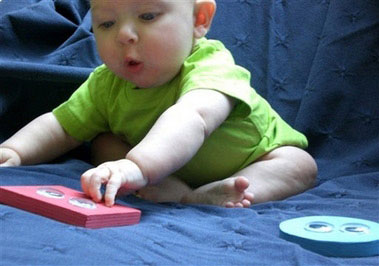This undated photo provided by Yale University shows an infant choosing a helpful toy instead of a hindering toy. During the experiment babies watch a toy try to climb a hill; another toy then comes by and either helps push the first toy over the mountain, or hinders it by pushing it back down. The babies almost always choose the helpful toy over the hindering one. (AP Photo/Yale University)
Babies who have not yet learned language have the ability to pick out who is naughty and who is nice, suggests a new study in Thursday's UK journal Nature.
Babies as young as 6 months old prefer people who help versus people who hurt, and this ability could be the foundation for moral thought and action later in life, said the researchers.
In the study that was set up to test this theory, researchers at Yale showed infants a variety of wooden characters, one of which looked like it was trying to climb a hill, with another trying to push it down and the third trying to help the first reach the hill's summit.
Up to 80 percent of infants when showed all of the characters reached out for the helping figure, opposed to the figure portrayed as the bad-guy.
Previous studies had showed that babies prefer physically attractive people, but there has been no data on whether babies judge people based on how they behave.
"It's incredibly impressive that babies can do this," said study lead author Kiley Hamlin, a psychology researcher at Yale University in New Haven, Conn. "It shows that we have these essential social skills occurring without much explicit teaching."
"Infants prefer an individual who helps another to one who hinders another, prefer a helping individual to a neutral individual and prefer a neutral individual to a hindering individual," wrote the researchers.
"These findings constitute evidence that pre-verbal infants assess individuals on the basis of their behaviour towards others."
In fact, being able to distinguish between friend or foe could be an important survival skill. "It's important to tell who is going to be helpful, who is going to be threatening," Hamlin noted.
But that's the evolutionary argument, and not one everyone would agree with it, said Tracy Dennis, an expert on child development and assistant professor of psychology at Hunter College in New York City.
"Even though these authors make a good argument that very young infants don't have a lot of time to learn, even some basic observation of people cooperating might be enough to make some learning take place," Dennis said. "It's important, but it's a study that people are going to debate about."
(Agencies via Xinhua News Agency November 22, 2007)


